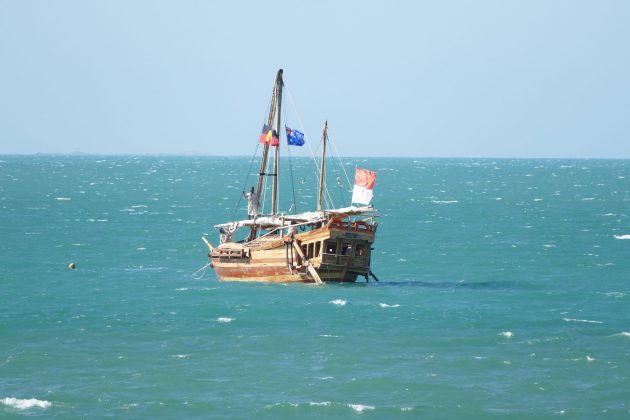In 1906 the South Australian government revoked the licences for Macassans to fish for trepang in North Australia.
Yesterday the Australian Prime Minister acknowledged this in the first visit to Macassar by an Australian head of state. In his press conference, he mentioned this unique centuries-old trade between the First Nations Australians, the Yolngu people of north-east Arnhem Land and the Macassan international traders. This unknown history of Australia has at last seen some public light.
The actions to first license the centuries-old trade and then to revoke those licences with the threat of gunboats being used against the Macassans if they came, has had many deep ramifications. That South Australian government, who administered the Northern Territory at the time, intended to take over the massive trepang trade into Southeast Asia and up into China, and even onto Japan by replacing the Macassan traders with British traders. This exercise failed as the new British owners had no real cross-cultural knowledge of the Asian culture and the necessary diplomatic connections.
If the Yolngu people had not been locked out of this Asian trade Northern Territory today would be a trading powerhouse into Southeast Asia. Yolngu people had all the cross-cultural knowledge and diplomatic connections in this Asian trade. They even intermarried, and a number of their people were unable to return home to Australia again after the Macassan trade was blocked, and they still live in Macassar today.
Sadly the actions of the new colonial government also completely devastated the economic activities of First Nations people in northern Australia. Steel objects that were once traded through the Yolngu people in the north found their way right down through the centre of Australia to the Great Australian Bight. In fact, massive trade tracks crisscrossed all over Australia and clans that were thousands of kilometres from each other were interdependent on this centuries-old trade.
This international trade was central to so many First Nations People’s economies. Some Yolngu clans traded only in tobacco that arrived on the northern shores of Australia with the Macassans. Others traded haberdashery, pots and pans. In fact the traded items into Australia included things like calico, guitars, playing cards, fishhooks, muskets and many other things. Of course, the steel items were highly prized, and tobacco was the currency of North Australia for many centuries.
Yolngu also traded things from North Australia into Macassar. This included timbers of many different types that the Macassans used in the construction of their boats and houses.
Even Samurai swords from Japan found their way to Australia in this trade and were highly prized by Yolngu elders who kept them as centuries-old heirlooms. Sadly Northern Territory police don’t know this, and some century-old heirlooms have been confiscated during the latest so-called clampdown on weapons in Yolngu communities. The new British colony never understood that “Aboriginal” people had a vibrant economic trading system that operated right across Australia and into Asia. Sadly that is still the case today.
A lot of this history can be found in the book Why Warriors Lie Down and Die.
Why Warriors Pty Ltd has also just launched a cross-cultural learning platform designed to teach English First Language Westerners appropriate cross-cultural knowledge and skills. It will also teach the original Australian “Aboriginal” culture, which is an Asian culture, necessary for building good business and diplomatic relationships with Asian clients.
Note. There is no sacred/secret information about Yolngu society in these courses.
A bit about Why Warriors Pty Ltd.
Why Warriors has created culturally appropriate answers to the Yolngu people’s questions about a range of other health issues, including 30 videos for the Covid 19 pandemic, we would like to do the same for Rheumatic Heart Disease and other chronic diseases, which in turn will provide Yolngu people with the knowledge they need to keep them alive.
Please team up with us to help us Close the Gap with this life-changing information. Click here to help.
Richard Trudgen
04/05/2022
For online or phone interviews, please contact Richard Trudgen
Email: richard.trudgen@whywarriors.com.au or call 0400 880 954
Richard Trudgen has been working with Yolngu people in Arnhem Land for over 50 years. He speaks Djambarrpuyŋu and is the author of Why Warriors Lie Down and Die. He is the CEO of Why Warriors Pty Ltd, a community development social enterprise company that empowers Yolngu and other First Nations people by providing access to information and building capacity and understanding between Australian Aboriginal people and the Dominant Culture.
Please sign up for Why Warriors News and Media releases.


